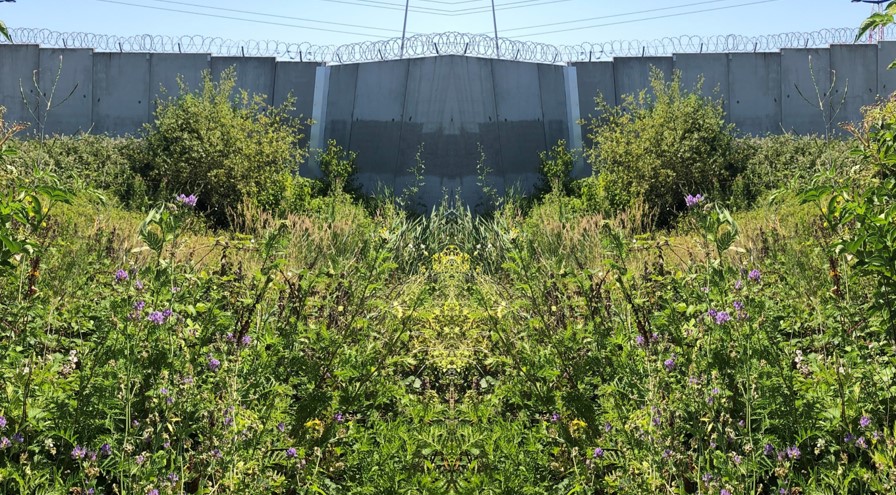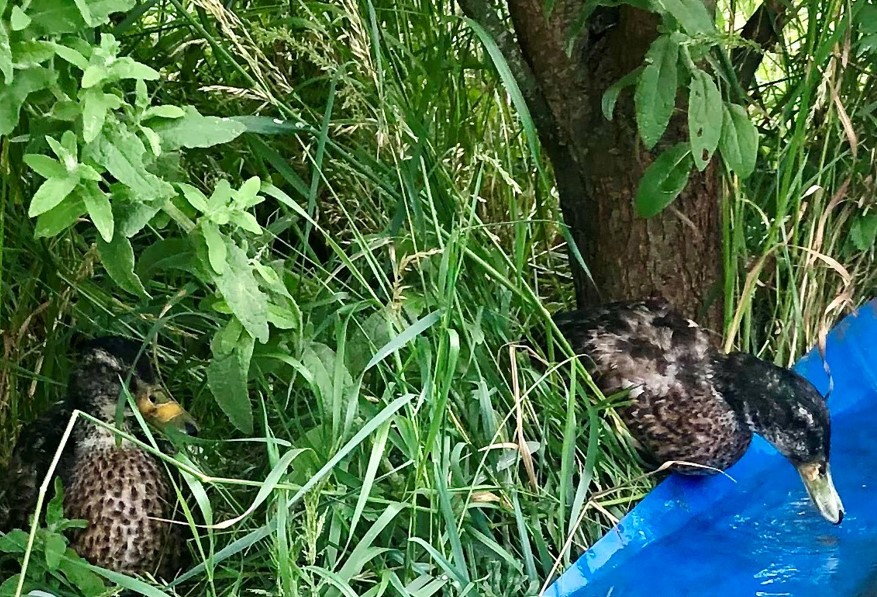Calais.
Come the fences,
Come the walls,
Come the boulders;
And then the wildflowers come.
Between the boulders and the wire of the old Stadium Camp, a scarlet and magenta blaze of poppies and wild geraniums. Further beyond, along the foot of the ‘security wall’, tower the tall stems of wild mustard studded with small yellow blooms. Russet and orange daisies mass across the roundabout where hazardous games of football were once played.
Displacement – Eviction – Replacement
And then the wildflowers come. Irrepressible, tenacious, the expression of an unbounded freedom.
‘When you have a dream, you have motivation….I will be a professor in America’. Ariam’s teenage exuberance lifts spirits. He’s sitting in the doorway of his tent swiping at the flies that buzz around him. His spoken English is near perfect. He freezes as a wasp is drawn to the honey that he’s spreading onto his breakfast bread. ‘There’s a different vibe today’ he says. All around the camp, a bustle of preparation; bags are being packed, shoes cleaned. ‘White shoes for UK,’ grins Temey as he re-laces his scrubbed-clean white trainers. ‘I leave my black shoes in France’. A round of farewells and he’s off with his friend Mebrahtu. ‘Breakfast in England….see you in Old Trafford’.
A warm but insistent wind blows in from the south-west. Mesfin is sweeping up rubbish using a willow branch. Eyob, the architect, bangs home a final nail into the windbreak he’s constructed from discarded pallets. He then turns his attention to another of his creations: the fire grill. It has a wooden block nailed to each corner and each block is set into an empty tin can filled with water. The fire is blazing, lunch is cooking and the tins need a top-up of water to prevent the blocks burning. Suddenly a call of ‘Gendar’*. Six police cars swing into the nearby car-park; it’s displacement time, again. Twenty police officers walk in single file towards the camp then fan out through the spaces between the tents and the trees. ‘Allez, allez’. It’s a well-rehearsed ritual, repeated every second day, designed to undermine any sense of permanence. The guys must move their tents into the car park; anything left behind will be taken away. The atmosphere is mostly cordial. One policeman sings to himself. After fifteen minutes, they have gone and the tents are re-pitched, cooking resumes, the day moves on.
A clearing in the willows and Adonay’s solitary tent. In the gaps between the trees, a wall of wild thistles. The purple blooms are transitioning; soon the feathery seed hairs will disperse with the wind. A blue half-barrel is filled with water; it serves as the duck pond. The well-fed camp ducks, a pair of mallard, sit in the willow shade, one of them tentatively dipping his bill into the water.
‘I really cannot stay in Calais any longer’, says Adonay. He is one of the ‘old guard’, here in the camp for eighteen months. Looking lovingly at the ducks he wonders why they don’t lay eggs.
‘Because they’re both males’ replies Negus, another of the ‘old guard’.
‘Why don’t they fly away?’
‘Perhaps you’ve given them too much food; they’re fat ducks!’
Adonay’s phone is tuned into the BBC World Service; Justin Welby, Archbishop of Canterbury, is interviewing the musician Nick Cave. Negus suggests a change of tone.
‘Watch this, it made me laugh till I cried’.
It’s a short animation called ‘Before Time, in the Beginning’. A pupil is being taught how to say ‘beginning’. He tries and tries…‘in the beninging…in the beninanging’….but it’s a step too far and he walks away. ‘Where are you going?’ the teacher demands. ‘I will go home now and start in the beninging’.
‘I will go home now.’ Negus dreams of home, of his mother, of a time before time…in the beginning. A strong gust blows through the clearing lifting a puff of thistledown. Soon the feathery seeds have vanished, gone with the wind.
*’Gendars’ (Gendarmes/police)

